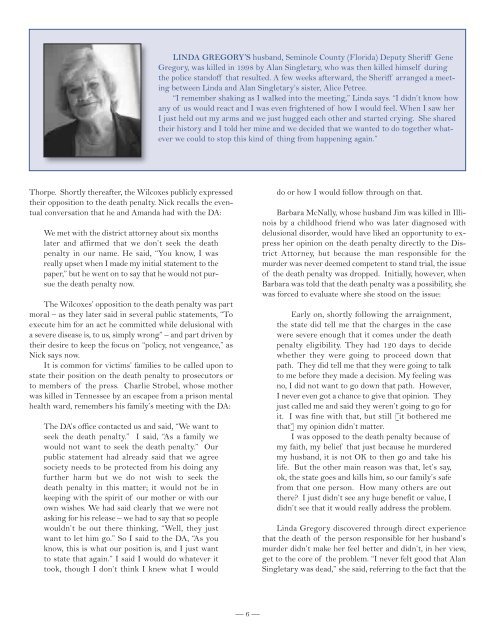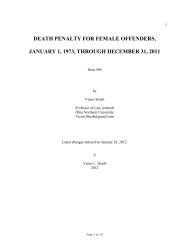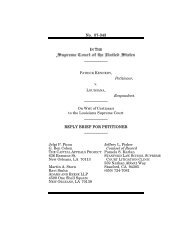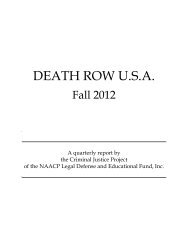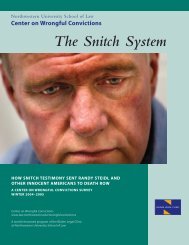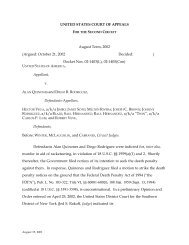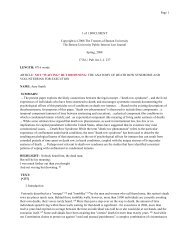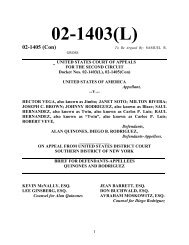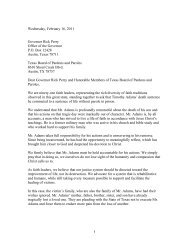Double Tragedies - Families for Human Rights
Double Tragedies - Families for Human Rights
Double Tragedies - Families for Human Rights
- No tags were found...
Create successful ePaper yourself
Turn your PDF publications into a flip-book with our unique Google optimized e-Paper software.
LINDA GREGORY’S husband, Seminole County (Florida) Deputy Sheriff GeneGregory, was killed in 1998 by Alan Singletary, who was then killed himself duringthe police standoff that resulted. A few weeks afterward, the Sheriff arranged a meetingbetween Linda and Alan Singletary’s sister, Alice Petree.“I remember shaking as I walked into the meeting,” Linda says. “I didn’t know howany of us would react and I was even frightened of how I would feel. When I saw herI just held out my arms and we just hugged each other and started crying. She sharedtheir history and I told her mine and we decided that we wanted to do together whateverwe could to stop this kind of thing from happening again.”Thorpe. Shortly thereafter, the Wilcoxes publicly expressedtheir opposition to the death penalty. Nick recalls the eventualconversation that he and Amanda had with the DA:We met with the district attorney about six monthslater and affirmed that we don’t seek the deathpenalty in our name. He said, “You know, I wasreally upset when I made my initial statement to thepaper,” but he went on to say that he would not pursuethe death penalty now.The Wilcoxes’ opposition to the death penalty was partmoral – as they later said in several public statements, “Toexecute him <strong>for</strong> an act he committed while delusional witha severe disease is, to us, simply wrong” – and part driven bytheir desire to keep the focus on “policy, not vengeance,” asNick says now.It is common <strong>for</strong> victims’ families to be called upon tostate their position on the death penalty to prosecutors orto members of the press. Charlie Strobel, whose motherwas killed in Tennessee by an escapee from a prison mentalhealth ward, remembers his family’s meeting with the DA:The DA’s office contacted us and said, “We want toseek the death penalty.” I said, “As a family wewould not want to seek the death penalty.” Ourpublic statement had already said that we agreesociety needs to be protected from his doing anyfurther harm but we do not wish to seek thedeath penalty in this matter; it would not be inkeeping with the spirit of our mother or with ourown wishes. We had said clearly that we were notasking <strong>for</strong> his release – we had to say that so peoplewouldn’t be out there thinking, “Well, they justwant to let him go.” So I said to the DA, “As youknow, this is what our position is, and I just wantto state that again.” I said I would do whatever ittook, though I don’t think I knew what I woulddo or how I would follow through on that.Barbara McNally, whose husband Jim was killed in Illinoisby a childhood friend who was later diagnosed withdelusional disorder, would have liked an opportunity to expressher opinion on the death penalty directly to the DistrictAttorney, but because the man responsible <strong>for</strong> themurder was never deemed competent to stand trial, the issueof the death penalty was dropped. Initially, however, whenBarbara was told that the death penalty was a possibility, shewas <strong>for</strong>ced to evaluate where she stood on the issue:Early on, shortly following the arraignment,the state did tell me that the charges in the casewere severe enough that it comes under the deathpenalty eligibility. They had 120 days to decidewhether they were going to proceed down thatpath. They did tell me that they were going to talkto me be<strong>for</strong>e they made a decision. My feeling wasno, I did not want to go down that path. However,I never even got a chance to give that opinion. Theyjust called me and said they weren’t going to go <strong>for</strong>it. I was fine with that, but still [it bothered methat] my opinion didn’t matter.I was opposed to the death penalty because ofmy faith, my belief that just because he murderedmy husband, it is not OK to then go and take hislife. But the other main reason was that, let’s say,ok, the state goes and kills him, so our family’s safefrom that one person. How many others are outthere? I just didn’t see any huge benefit or value, Ididn’t see that it would really address the problem.Linda Gregory discovered through direct experiencethat the death of the person responsible <strong>for</strong> her husband’smurder didn’t make her feel better and didn’t, in her view,get to the core of the problem. “I never felt good that AlanSingletary was dead,” she said, referring to the fact that the__ 6 __


